The British prime minister, David Cameron, met the Iranian president, Hassan Rouhani, in New York on Wednesday in what marks a milestone in the long-strained relations between London and Tehran.
The meeting - as the two leaders attended the UN general assembly - was the first encounter between an Iranian president and a British prime minister since the 1979 Islamic revolution.
Iranian reporters in Rouhani’s UN entourage tweeted pictures of the smiling Iranian cleric shaking hands with Cameron in front of the two countries’ flags.
“A little bit of history made,” the prime minister was overheard telling one of his aides, according to a tweet by a British reporter , as the meeting ended.
After leaving the hour-long meeting with Rouhani, Cameron is overheard telling an aide: "A little bit of history made."
— Emily Ashton (@elashton) September 24, 2014
Rouhani’s deputy, Hamid Abutalebi, said the meeting would prepare the ground for “fundamental changes” in the relationship between Iran and the EU.
It “will bring fundamental changes to Iran-EU relations as well the nuclear negotiations,” he said, according to the semi-official Isna news agency. “It will be one of the biggest achievements of Dr Rouhani’s visit to New York and it will also have an affect on Tehran-London relations.”
Despite the meeting’s significance, Rouhani has to proceed cautiously as he visits the UN, accommodating world leaders while not upsetting hardliners at home. The domestic repercussions of any statements he makes or meetings he attends can be costly and hawks and fundamentalists, such as those in the Iranian parliament, will be circling like vultures to watch him slip.
Before the Cameron meeting, Rouhani had already met a number of world leaders, including France’s François Hollande and Austria’s Heinz Fischer, but with suspicion of Britain rife in Iran it will be the most-scrutinised at home.Iranian hardliners have an extraordinary obsession with Britain (which they still consider “the old fox”) and approach it with a conspiratorial mindset. In their view, British hands are behind everything political in Tehran and the royal family still runs Westminster. Iranian conservatives have a suspicion towards Britain much deeper and stronger than towards the United States.
The British embassy in Tehran, which was shut down in 2011 following an attack by an angry mob, remains closed. Both sides have decided to reopen embassies but complications in Iran mean the UK mission is not fully open.
Iranians with dual British citizenship are also subject to scrutiny and a number of them are being held in jail, including Ghonceh Ghavami, a 25-year-old female University of London graduate who was arrested nearly three months ago for trying to enter sports stadiums with men.
Amnesty said in a statement ahead of the meeting that “President Rouhani must be left in no doubt that the UK will not accept the jailing of this young British woman simply for mounting a peaceful protest over a ban on women attending sporting events in Iran.”
Keyhan, an ultra-conservative Iranian newspaper whose director is appointed directly by the country’s supreme leader, Ayatollah Ali Khamenei, published an editorial on Wednesday cautioning Rouhani about his meetings and a potential agreement with the west over Tehran’s nuclear programme.
Under the headline “The unfinished war”, the piece reminds its readers that the US and “England” – as Britain is usually called in the Iranian press – supported Baghdad in the eight-year war between Iraq and Iran in the 80s and still imposes sanctions on Tehran.
“The world’s imperialist faction [a familiar reference to Britain and the US] is aiming to bring the powerful and revolutionary Iran to its knees,” the article said.
However, Sadeq Zibakalam, a Tehran University professor, writing in the reformist Shargh daily on Wednesday, called the Rouhani-Cameron meeting historic and said it could also pave the way for a potential meeting with Obama. “With a flower, you can’t have a full spring but when a flower blossoms it means an end to the winter season,” he said.
Last year in New York, Rouhani made a difficult choice and despite his own willingness decided not to commit to a historic handshake in the corridors of the UN headquarters with the US president, Barack Obama.
Instead, he opted for a less controversial, yet hugely significant, telephone conversation with the American leader. Still, he remembers well that he returned home to Tehran airport to protesters throwing eggs and shoes at him.
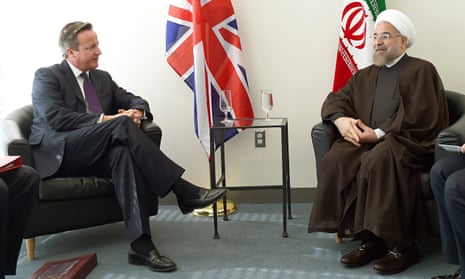
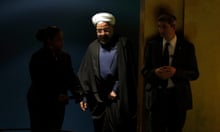
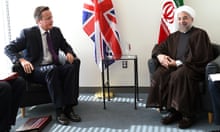
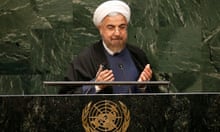
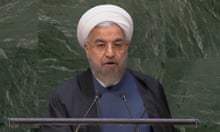


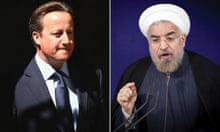
Comments (…)
Sign in or create your Guardian account to join the discussion